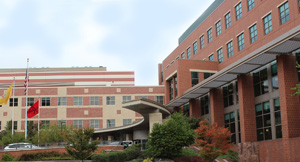June 1, 2020:
 As New Jersey’s only National Cancer Institute (NCI)-designated Comprehensive Cancer Center, Rutgers Cancer Institute of New Jersey’s team of internationally recognized physicians and researchers is driven by a singular focus and mission, to help individuals fight cancer. Through the transformation of laboratory discoveries into clinical practice, we target cancer with precision medicine, immunotherapy and clinical trials and provide the most advanced, comprehensive, and compassionate world-class cancer care to adults and children. This mission is being accomplished in partnership with RWJBarnabas Health. Rutgers Cancer Institute physicians and scientists work side by side to make sure the most sophisticated treatments are delivered to our patients quickly and safely – the future of cancer treatments today.
As New Jersey’s only National Cancer Institute (NCI)-designated Comprehensive Cancer Center, Rutgers Cancer Institute of New Jersey’s team of internationally recognized physicians and researchers is driven by a singular focus and mission, to help individuals fight cancer. Through the transformation of laboratory discoveries into clinical practice, we target cancer with precision medicine, immunotherapy and clinical trials and provide the most advanced, comprehensive, and compassionate world-class cancer care to adults and children. This mission is being accomplished in partnership with RWJBarnabas Health. Rutgers Cancer Institute physicians and scientists work side by side to make sure the most sophisticated treatments are delivered to our patients quickly and safely – the future of cancer treatments today.
Investigator Spotlight
Andrew M. Evens, DO, MSc, FACP, Rutgers Cancer Institute of New Jersey
Educational background
- DO: Chicago College of Osteopathic Medicine
- Internship/Residency: Lutheran General Hospital, Park Ridge, Illinois
- Fellowship: The Robert H. Lurie Comprehensive Cancer Center of Northwestern University
Research interests
I am a clinical and translational physician scientist with expertise in lymphoid malignancies, including Hodgkin lymphoma, non-Hodgkin lymphoma, chronic lymphocytic leukemia, and cellular therapy. My individual research career is focused on three areas: 1) clinical investigation of novel and targeted therapeutic agents in lymphoma, including biomarker discovery; 2) lymphoma biology with transcriptomics and systems biology analyses; and 3) health outcomes in lymphoma, including epidemiology, pharmacovigilance, “real world” prognostication, and clinical decision making/modeling.
Little-known facts about Dr. Evens
- I was born in Buffalo, New York, and remain an avid Buffalo sports fan. (Go Sabres and Bills!)
- I played college basketball and was a Bill Bradley NCCA Academic All-American.
- I greatly enjoy the outdoors – especially hiking, swimming, and taking walks with my Pomeranian dog, Mocha!
Thought Leader Perspectives
 Steven K. Libutti, MD, FACS, director, Rutgers Cancer Institute of New Jersey; senior vice president of oncology services, RWJBarnabas Health.
Steven K. Libutti, MD, FACS, director, Rutgers Cancer Institute of New Jersey; senior vice president of oncology services, RWJBarnabas Health.
As members of the Big Ten Cancer Research Consortium, we often engage in collaborative investigation to push the needle on finding new cancer treatments and better understanding an old enemy. Lately we find ourselves trying to understand a new enemy – COVID-19 – and the impact it has on cancer care and research. Now more than ever, a collaborative spirit is needed in order to defeat this current pandemic and prepare ourselves against others that may arise in the future.
Rutgers Cancer Institute of New Jersey is at the forefront of cancer research, treatment, prevention and education. We are able to focus on these core pillars through an integrated care model with RWJBarnabas Health – driven in part by investigator-initiated scientific exploration.
That partnership, coupled with our infrastructure and expertise as New Jersey’s s only National Cancer Institute-designated Comprehensive Cancer Center, has enabled us to conduct a clinical trial examining a potential treatment for COVID-19 that is not limited to cancer patients. From conception to first accrual, we were able to launch this trial in an unprecedented nine days.
This rapid approval not only speaks to our structure as an NCI center to quickly and efficiently deploy clinical trials, but also to the overall collaborative spirit we maintain with other cancer centers, cooperative groups, academia and industry. By working across multiple disciplines and specialties, across state lines, and across institutions, we unite with the strength that is needed to defeat this latest enemy.
 All the while, oncology programs across the nation are doing everything they can to address the complexities of caring for cancer patients amid this pandemic, especially for those cancer patients who have been impacted by COVID-19. Rutgers Cancer Institute continues to be part of the national conversation on this, while serving as a resource to our local communities and state.
All the while, oncology programs across the nation are doing everything they can to address the complexities of caring for cancer patients amid this pandemic, especially for those cancer patients who have been impacted by COVID-19. Rutgers Cancer Institute continues to be part of the national conversation on this, while serving as a resource to our local communities and state.
In the early days of the pandemic, we took the initiative to develop and lead a New Jersey Statewide Cancer Programs Collaboration. Cancer centers and programs from around our state meet virtually each week to share common experiences and challenges we’re having. Whether it’s how to accomplish social distancing, deploy telemedicine options, or maintaining clinical protocols, we discuss how we can work together as a collective to find solutions that will help us maintain cancer care in a safe environment during such an extraordinary time.
Along with RWJBarnabas Health, the Big Ten Cancer Research Consortium and others, Rutgers Cancer Institute of New Jersey is proud to stand with all of our collaborators to ensure safe and integrated care for our patients, as well as drive scientific advances that reduce cancer mortality and contribute to the greater public health in unprecedented times such as these.
About the Big Ten Cancer Research Consortium: The Big Ten Cancer Research Consortium was created in 2013 to transform the conduct of cancer research through collaborative, hypothesis-driven, highly translational oncology trials that leverage the scientific and clinical expertise of Big Ten universities. The goal of the Big Ten Cancer Research Consortium is to create a unique team-research culture to drive science rapidly from ideas to new approaches to cancer treatment. Within this innovative environment, today’s research leaders collaborate with and mentor the research leaders of tomorrow with the unified goal of improving the lives of all patients with cancer.
About the Big Ten Conference: The Big Ten Conference is an association of world-class universities whose member institutions share a common mission of research, graduate, professional and undergraduate teaching and public service. Founded in 1896, the Big Ten has sustained a comprehensive set of shared practices and policies that enforce the priority of academics in the lives of students competing in intercollegiate athletics and emphasize the values of integrity, fairness and competitiveness. The broad-based programs of the 14 Big Ten institutions will provide over $200 million in direct financial support to more than 9,800 students for more than 11,000 participation opportunities on 350 teams in 42 different sports. The Big Ten sponsors 28 official conference sports, 14 for men and 14 for women, including the addition of men’s ice hockey and men’s and women’s lacrosse since 2013. For more information, visit www.bigten.org.
















Subscribe to the Big Ten CRC Newsletter X
X Facebook
Facebook YouTube
YouTube